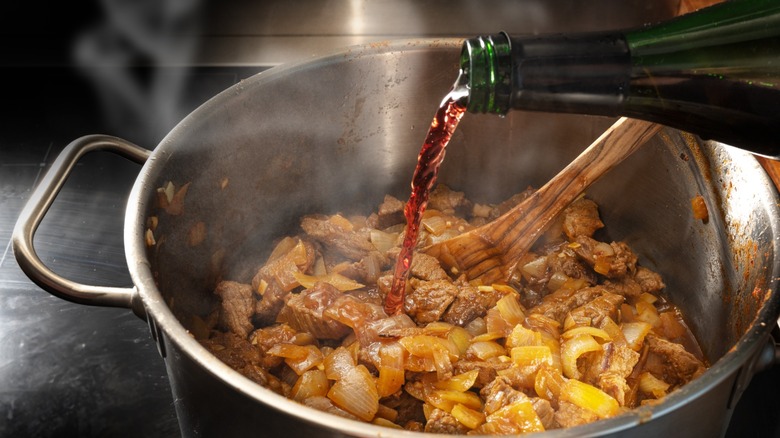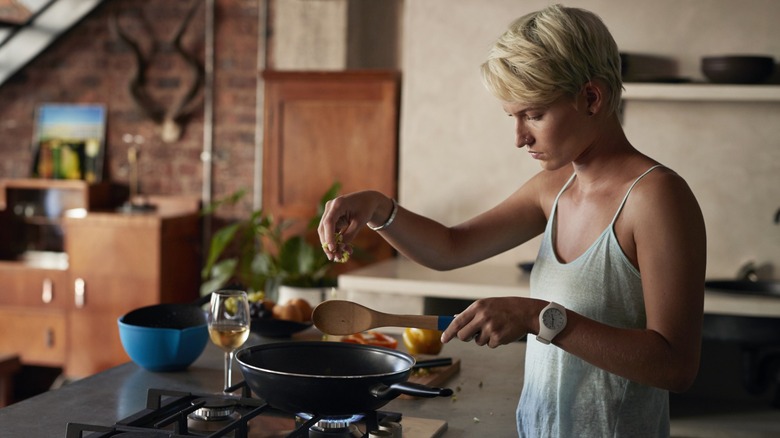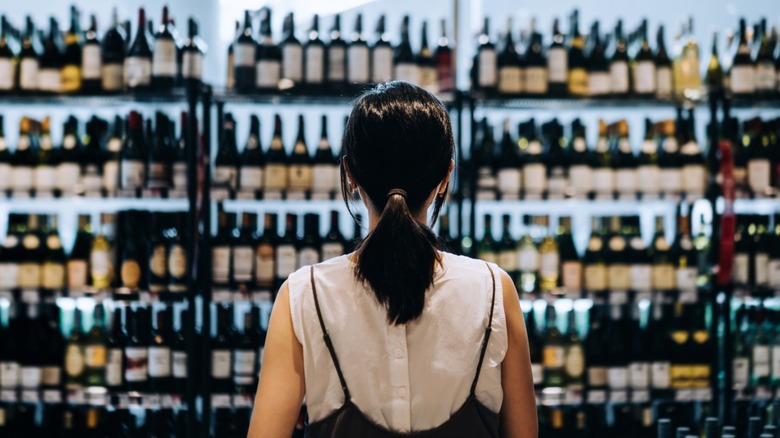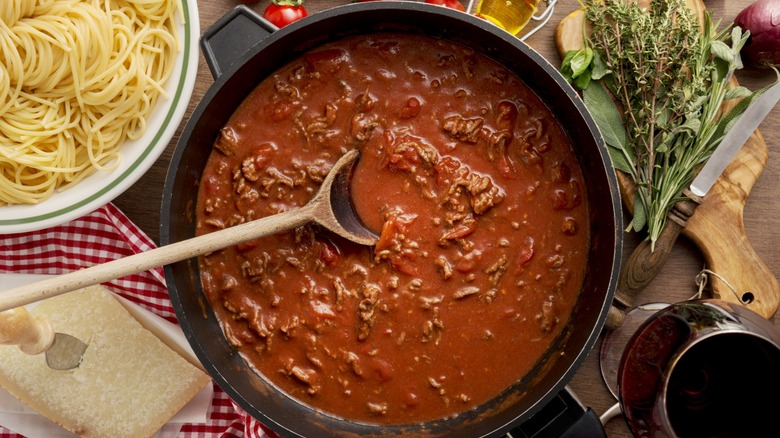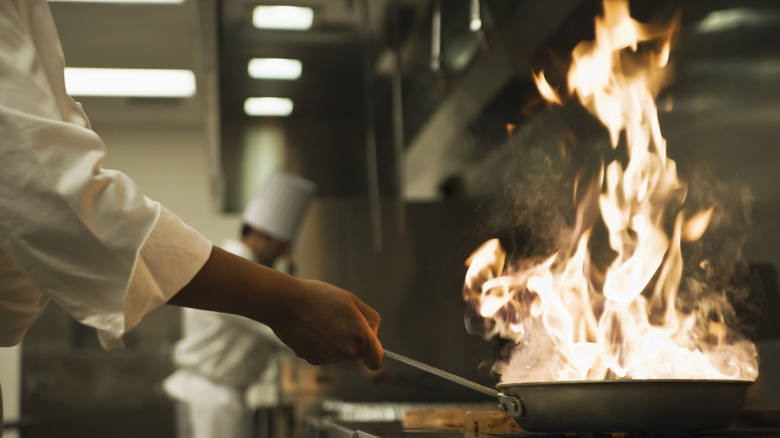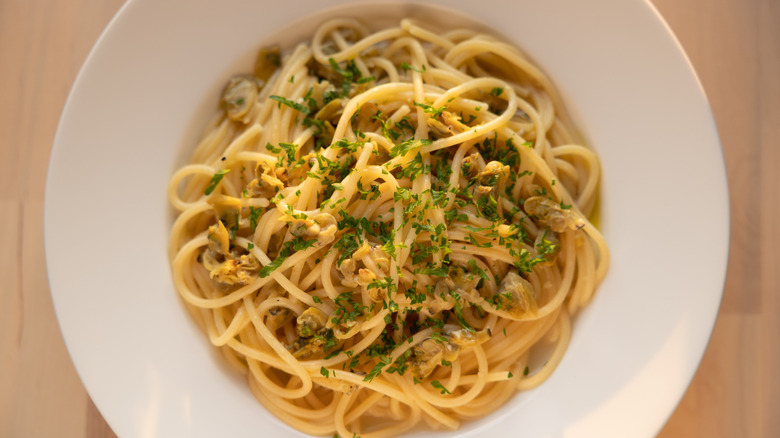How To Use Cooking Wines In Sauces: A Beginner's Guide
From garlic butter sauce to herb gravy, and from steakhouse mushroom sauce to a classic port wine reduction, some sauces just aren't the same without the inherent flavor of wine — whether it be a red one or a white one. But, just as the wide world of wine regions and varietals can feel intimidating for beginners, so can the vast number of sauces made with them. Whether it be something as simple as a white wine reduction sauce, or something more technical like a bordelaise, when you're standing in the wine aisle trying to figure out what's dry and what's sweet, or which has more body and which is more tannic, your choice is only further complicated by what wine will work best in your sauce, and how you're going to prepare it. You also want to make sure you're steering clear of the wine varieties you should absolutely avoid cooking with.
Fortunately, Tasting Table has Chef Matthew Stowe (@chefmatthewstowe on Instagram) of Joey Restaurants to help us avoid mistakes everyone makes when cooking with wine. Chef Stowe is an author and Culinary Institute of America alumni. Born and raised in Surrey, British Columbia, he built his career in the kitchen of the famous French restaurant, Lutèce, in New York City before eventually moving back to Canada. There, he became the executive chef of Sonora Resort, where he helped it earn the prestigious Relais & Châteaux designation before joining Cactus Club Cafe and winning "Top Chef Canada" — a show on which he continues to appear as a guest judge. All of this goes to say that, if anyone knows anything about wine sauces, it's him.
Be wary of your wine's salt content
One of the first things that Chef Stowe mentions about wine sauces is the importance of being wary of a wine's salt content. As he explained, "A lot of times, cooking wine will have a good amount of salt in it as a preservative. So then, in any white wine sauces, typically you're reducing the wine. So, if that's the case, then you're also reducing salt." This isn't actually common knowledge, but Stowe assured us that, if it's a specified cooking wine, it will definitely have some amount of salt in it in order for it to be shelf stable. In case you were wondering, yes, you can drink cooking wine — but those salts and preservatives might be off-putting. And the thing is, you never really know how much salt is in it, which can really cause issues when you're reducing it in a sauce.
"When you reduce anything in cooking, you're evaporating water and you're intensifying flavor, whether that's chicken stock, veal stock, white wine, doesn't matter," said Stowe. The same thing goes for the salt in your cooking wine. As he told us, "Understanding your ingredients is very important. It's one of those basic skills that, as a cook, it takes a while to master, but when you do, your foundation is super strong ... Long story short, you definitely want to be able to limit the amount of salt in the products you're using." To be safe, his best recommendation is to opt for neutral, unsalted ingredients and salt the sauce yourself so you have more control.
Quality applies to the wine you cook with, too
Although there are sauces where you cook the wine off more and others that you cook it off less (more on that later), Chef Stowe claims that the taste and quality of the wine you use in your sauce is just as important as the wine you drink. He told us that, "If you start with a low quality product and you're reducing it, you're just making it essentially worse if you will, if you think of it like that." So, first things first, you want to get yourself a good quality wine, or, as Stowe put it: "You want to be able to drink the wine you're cooking with, whether that be red wine [or a] white wine."
So, what exactly is a good quality wine and how do you shop for it? The easiest way is to start by focusing on how to not shop for bad wine. Lucia Capretti, fellow Tasting Table writer and wine expert, compiled a guideline on the 12 mistakes you should avoid when shopping for bottles of wine — including helpful tips like not using the price as a guideline for quality, something that Stowe actually agrees with when it comes to cooking wine. He told us that you don't have to go above your budget or splurge to get a good quality wine for your sauce. Instead, focus on the kind of wine you like, and what you can afford.
Keep the type of sauce you're making in mind
When you're shopping for a cooking wine, it can be helpful to keep the actual type of sauce that you're making in mind. For instance, Kieron Hales, the chef and co-owner of Zingerman's Cornman Farms, told us that the best type of red wine for a mushroom sauce is a pinot noir — thanks to its light-medium body and earthy notes. The best wine when making sauce for fish, on the other hand, falls in line with Chef Stowe's stance on enjoying drinking the wine you're cooking with, in that it will be whatever white wine you're already sipping. Roberta Muir, the food and wine expert behind Be Inspired Food-Wine-Travel, agrees. Sometimes the best wine for your sauce isn't so simple, however.
For example, while red wine is the common choice in Italian red sauces, Alessandra Rotondi, the wine director of Serafina and Serafina Vino E Cucina, argues for adding white wine to your tomato sauce. Once you've chosen a wine for your sauce, Chef Stowe says you also have to consider how much of its flavor you want to come through in your sauce. "Sometimes a sauce is actually nice with a little bit more of a raw wine flavor in it, or you may want to reduce the sauce to kind of intensify the acidity of it that you're going to whisk in a lot of butter or fat into it," he said.
The time it takes to cook away the booze depends on the sauce itself
Chef Stowe also told us that there's not any hard and fast rule as it pertains to the amount of time it might take to cook off the booze in your sauce. Apart from cooking it more or less depending on the amount of wine flavor you want to shine through, he said: "There's lots of factors. If it's in a frying pan that's very wide, it's going to be quicker. If it's in a narrow pot, it's going to take a little longer because it's going to have less surface area." But what he did say is that, if you're using a frying pan, it shouldn't take more than five minutes.
"It just depends on how much you're reducing and how much liquid you have," Stowe explained. "You can add a splash and it's gone in literally 20 seconds, or you could take half a bottle and it could take five, 10 minutes." But, when it comes to the timing of cooking the wine out of your wine sauce, you should also consider the order in which you add ingredients to your sauce — especially if you're making a cream based one. "Oftentimes in a white wine sauce, there's a lot of fat," said Stowe. "You reduce your white wine and then you would add your cream." He also recommends adding a squeeze of lemon juice in at the end.
A simple taste test is a safe way to know when the wine is cooked down
While Chef Stowe says there's no exact time it will take to cook the wine off of your sauce, he does offer some advice for knowing when it's cooked off. The easiest and most obvious way is to use a match or lighter to ignite the sauce. "You can light it on fire and then when the flames are gone, you know the alcohol's gone. That's the easiest thing to do," he said. "By lighting it, that's a telltale sign on when the alcohol is going to be evaporated." However, for those of you with children at home or small kitchens, there is another, less hazardous way to tell that the wine is cooked off: tasting it and seasoning in layers.
"I think that's the biggest thing with cooking, and the biggest mistake people make sometimes is they're not tasting as they go, and the beauty is the more you cook, you're basically making little deposits in your mind every time you taste stuff and you build up this flavor memory," said Stowe. "But, when you taste it and go, 'I can still taste the raw alcohol. I want to keep cooking it' ..." you'll know that the wine hasn't fully cooked off yet. As Stowe told us, "Really, at the end of the day, tasting is going to be way more important than setting a timer or anything like that." Here are a few additional tips you need when cooking with wine.
